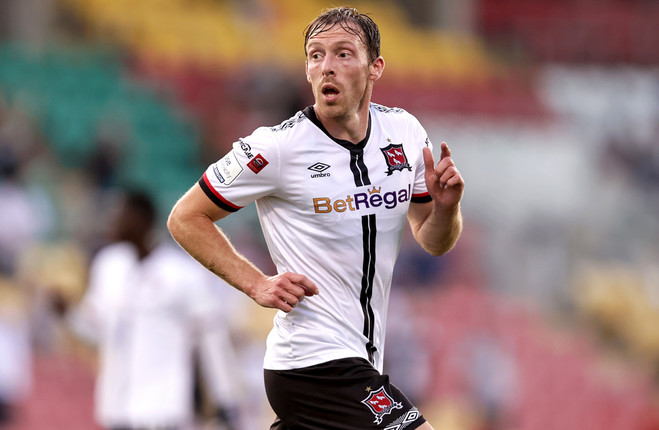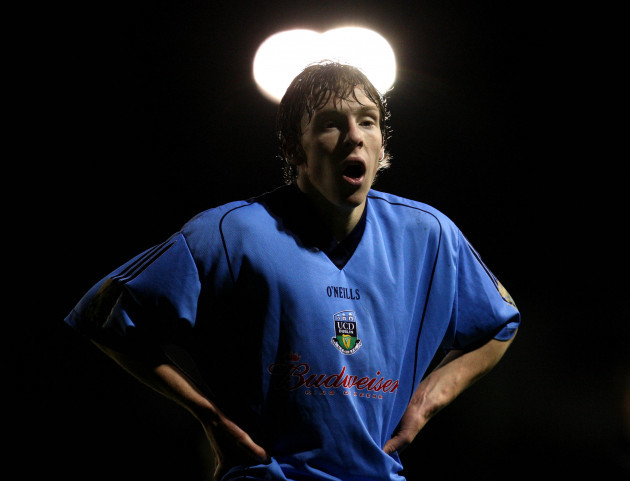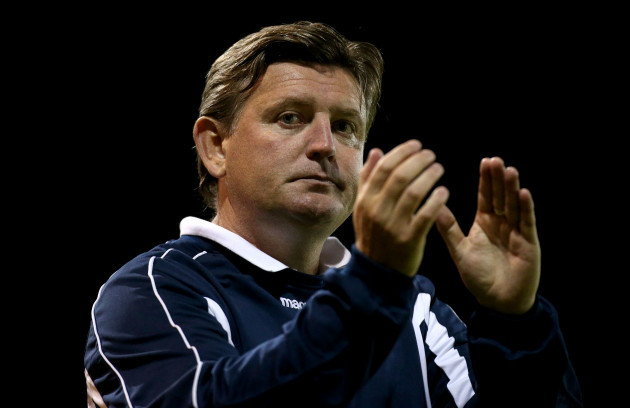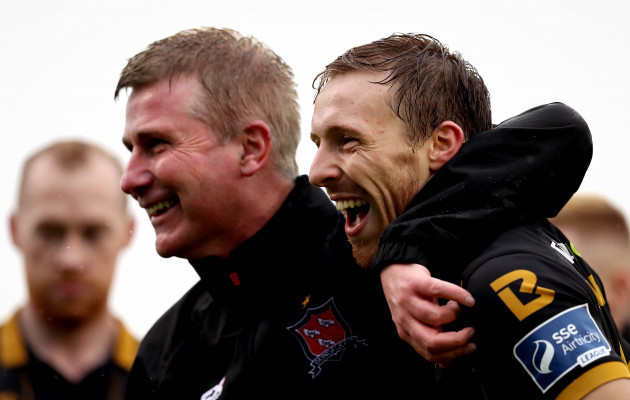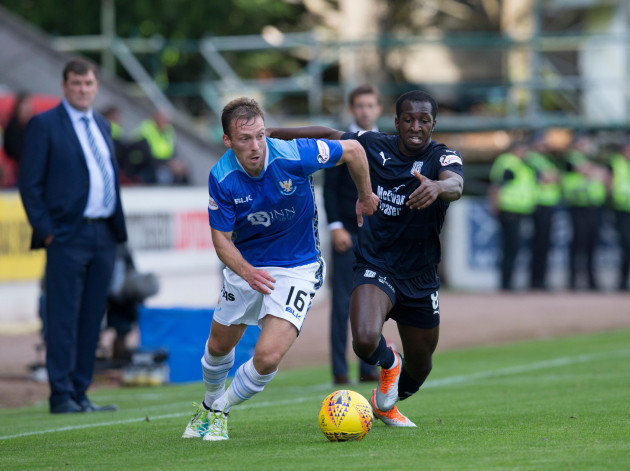HAVING ANNOUNCED his retirement in February, David McMillan is finally able to enjoy the extra freedom afforded to him as an ex-footballer.
When we speak, he has just returned from a skiing trip.
“To be honest, I never even considered it or never even would have thought about going over the last few years. Probably too high risk, but I came home without an injury, which was the main thing.
“I got on well and improved over the week. Probably the football skills come in handy, a bit of balance and all that. I did some red slopes [for advanced intermediates] by the end of the week, so it wasn’t too bad.”
For the 34-year-old, the decision to retire was due to “multiple things”.
He went on another trip away to Thailand last December while considering his future in the game after his second spell at Dundalk ended.
“Plenty of clubs called me,” he adds, but in the end, when he contemplated the prospect of another season in Irish football, the cons outweighed the pros.
“I think your enjoyment of it is a big part of why you do it. I wouldn’t say I wasn’t enjoying it anymore. But it was becoming harder to get up in the morning and keep training every day physically. And that starts to take its toll and your enjoyment slightly starts to wane — particularly last year when I wasn’t playing as much as I would have liked, it was a tough season in that regard.
“And I could have played on at a lower level. But the questions [I asked myself] were: ‘Why are you doing it? Why are you continuing to play? What do you want to achieve and so forth.’”
In the end, McMillan can reflect on a fantastic career that included three Premier Division title wins, two FAI Cups, and two appearances in the PFAI Team of the Year — not bad for a footballer who was far from a prodigy growing up and actually gave up the sport for a substantial period.
He was coincidentally coached by a former Dundalk star, Paul Newe, at local club Templeogue United, in addition to playing on the back green with another future League of Ireland player, his brother Evan, among others.
“I used to play all sorts of other sports, badminton, tennis, Gaelic football — I tried my hand at everything. I couldn’t give you the exact dates that I stopped [playing football]. But I probably [missed out on] two or three years and then went back to it.”
But around the age of 16, McMillan returned to the sport he had “always watched more than anything else”.
Yet even then, McMillan was far from an obvious star in the making.
“I wasn’t the young sensational kid who was travelling across to the UK,” he explains.
“I just stopped because I had weekends where I’d be playing other sports and you just couldn’t manage to do everything. And you’d be letting one team down if you didn’t go on a certain weekend or whatever.
“So football sort of took a backseat for a little while. I fell back in love with it again, when I was a little bit older, and I never really looked back.
“Playing other sports does help as well, what you can do in terms of movement, flexibility, all those types of things that you learn.”
It was only while in his first year studying architecture at UCD that the idea of a career in football started to seem like a viable prospect.
McMillan initially played under Diarmuid McNally and Tony Sheridan in the Leinster Senior League. But after scoring “a hatful of goals,” he was promptly promoted to the senior team.
As Johan Cruyff once famously remarked, ‘every disadvantage has its advantage,’ and this phrase clearly applied to McMillan. The young striker did not consider himself to be particularly talented in those early days but says this inherent inferiority complex also inspired a sense of discipline and a determined mindset that evidently was enough to elevate him above others in a highly competitive field.
“Underdog isn’t really the right phrase, but I always felt I was competing with people who were more talented than I was. I remember moving up into the A championship squad at UCD. Keith Ward and Enda Stevens arrived one day from whatever youth club they were with, a Fás course or something. And I was thinking: ‘Jeez, these guys are just a level above with their technical ability,’ and all that.
“So I always felt I had to work harder than everybody else to try and just even stay afloat. I was probably fortunate Martin Russell took over when UCD were relegated and he seemed to put a lot of faith in me and played me regularly.
“That trust made me believe that I was good enough to do well, but I think I had that throughout my career in different clubs. There were players I always felt had a little bit more ability, and that probably pushed me to just work harder, to try and stay in the team or get into the team. So I think always having to prove myself drove me on.”
However, McMillan also did acquire more self-belief as his career developed.
“In the early days, playing the first couple of games, with UCD, where crowds were small, I’d say I was anxious enough on the pitch. Playing at that level when you’re young can be a bit daunting. But certainly, as I got older, even in the biggest of games, I never really had any nerves. I was always more confident and at that point, I knew my ability and I was just going to give it everything. All you can ask of any player is that they give their best. I always felt that if I went out and ran around and worked as hard as I could even if I had a bad day, nobody could say anything negative once I put in all the effort.”
Success for McMillan was far from instantaneous though. After impressing at UCD, he secured a move to St Patrick’s Athletic amid a reunion with former Students boss Pete Mahon.
Yet there was intense competition for places and he wasn’t always the first choice, with Ian Daly, Danny North, and Daryl Kavanagh all vying for spots up front.
“That competition probably helped me and that was the first time in a senior setup where you’re out of UCD and you’re playing with senior players. And that year taught me a lot, I grew up during that season and it set me well for the rest of my career.”
It was then that McMillan took a break from the League of Ireland to do an Erasmus semester in Australia.
It also happened to coincide with an injury, though McMillan still managed to play a couple of games over there for Olympic — a semi-professional side in the Brisbane Premier League. A chance was there, he adds, to play at a higher level in the country, but he was put off by the “astronomical” travel that would often entail taking flights to away games.
“I was glad that I did it looking back because, with football, you can imagine college life you give up a lot of nights out, you give up your summers where your friends are going abroad or living in America for three or four months, you give up all those things. I had given up a lot. And it was one thing that I felt, you know what, let’s just go and do this and enjoy it.”
A second spell at UCD ensued where McMillan impressed again and took his overall tally with the Students to 42 goals in 96 appearances amid one of the most prolific periods of his career.
The youngster had signed an 18-month deal with the Belfield outfit on the agreement that they would release him from his contract if he wanted to leave at the end of it, and that is exactly what transpired.
The next move to Sligo Rovers proved a disappointment as he only scored once in 13 Premier Division appearances.
“I had a difficult decision of whether to stay at UCD because I was on such a good run and finish off the season strong and try and hit as many goals as I could and hopefully get a move abroad at that point.
“Maybe in hindsight, that would have been the better decision, but I felt obviously going to Sligo, the wages were significantly better than what was available at UCD and that probably persuaded me to go, and in the end, it didn’t work out as well as I would have liked.”
Nonetheless, as was the case with so many Dundalk players around the period that were perceived as outcasts elsewhere, a certain manager by the name of Stephen Kenny recognised McMillan’s potential and brought him to the Lilywhites ahead of the 2014 campaign.
It came after nothing had materialised from “a couple of trials in the UK” during the offseason.
“Stephen had been in touch about signing. John Caulfield had been in touch at Cork as well. And I put them both off until I had come home. And I remember thinking about signing for Dundalk, considering all the travel up and down, how that would work. And in the end, it was the best decision that I ever made.
“And when you meet Stephen, he’s very honest, he doesn’t try and blow smoke up your arse. He just tells it as it is, he will tell you what he believes your strengths and weaknesses are and what he can improve in you.
“I remember him saying he had looked to sign me that summer I went to Sligo but just felt financially Dundalk weren’t able to do it at that point. And obviously, they were growing as a club — they finished second that year in 2013.”
McMillan would subsequently play a key part in one of the most successful League of Ireland sides ever, winning three league titles in four years, as well as the 2015 FAI Cup.
Yet an unprecedented run in Europe topped everything else. The key game was at home to Belarussian side BATE Borisov. Trailing 1-0 from the first leg, McMillan’s two goals put the Irish side in the driving seat before Robbie Benson all but confirmed their passage into the next round with a late third.
The win left them 180 minutes away from a place in the Champions League group stages, and even though they were ultimately were beaten 3-1 on aggregate by Legia Warsaw, the Lilywhites were still guaranteed a place in the Europa League group stages and a payday of over £4 million.
You could therefore argue that McMillan’s goals on that night were among the most important ever scored by an Irishman in European club football. Without those goals, it’s not unreasonable to suggest Irish football history would be drastically different — Dundalk would likely not have hit the same heights and Kenny may not have even become Ireland manager.
“Everybody had a little bit of a point to prove [at Dundalk] to some extent,” he says. “There weren’t too many in the group, who had won anything or were going in there resting on their laurels. I think everybody was hungry. And there was just a real drive behind the group, a really good work ethic. And very few distractions or very few players with big egos who didn’t buy into the way that everybody worked. Obviously, Stephen [Kenny] was the driver of all that, he knew the type of player that he wanted, and he went and got them, collaborated, and made it work.”
McMillan personally was no exception to the rule of Dundalk recruiting players who were overlooked and underestimated elsewhere, as those unsuccessful trials across the water still would have been fresh in his mind by the time he joined. What they achieved, however, was beyond anyone’s wildest dreams.
“Even signing I wouldn’t have expected the success that we had,” he recalls.
At the end of the 2017 season, McMillan did eventually get his move to Britain. It came later than expected at the age of 28, signing a two-and-a-half-year deal with Scottish Premiership side St Johnstone.
“To get the opportunity at that stage was unexpected, but I felt we’d obviously won a number of leagues, FAI Cups, the achievements in Europe.
“I remember meeting Stephen and I hadn’t made my decision to leave at that point. And Stephen said is there much point [in discussing it], most players are going to accept this opportunity, are you actually going to turn it down? And I was like, well we need to consider everything. But in the end, it was a decision that I didn’t think I could turn down, to go and experience a different league.
“And obviously, the size of clubs that you would come up against in Celtic and Rangers was just an opportunity that I wanted to experience.”
Ultimately, the expectation didn’t quite match up to reality.
“Overall, my time in Scotland was one of frustration. I hate speaking about it, how often do you read about people’s experiences, and they speak about injuries and how they curtailed them?
“And I certainly don’t think my time there should be based on an injury, obviously I feel like I didn’t do enough. And ultimately, whatever the reasons, I came up short in terms of playing enough times for St Johnstone and being successful there.
“But it certainly was hampered by being injured in my first game and missing the first half of the season there. But even with that, I came back at the end of the first season, and scored a number of goals for the last three or four games and really felt good about things, then going into the new season thinking: ‘I can do well at this level.’ But my opportunities were really limited for the start of the following season.
“They were limited because presumably, the manager felt my performances weren’t good enough. And by January, he wanted me out.
“So after signing a two-and-a-half-year contract, making the move across, and only being fit and available for probably four or five months of the season and being told you can leave the club, that was a really difficult thing to try and accept and move on from. From there, it was just trying to scramble to move to clubs to try and get game time and try to prove yourself. And ultimately, it just quite didn’t happen for me.”
McMillan feels League of Ireland players often have to do more than the average footballer to prove themselves in Scotland, though cites the encouraging recent form of players like Jamie McGrath and Dan Casey as reasons for optimism in that regard.
“Going over, part of my ambition was to try and do as well as I could because I felt there should be more opportunities for Irish players to get that move.
“I can remember around the time I went, you’d see a lot of players coming from the Northern Irish league to Scotland. And that’s probably through familiarity and I know there are a lot of Northern Irish managers based in Scotland as well. And it just was more limited opportunities for League of Ireland players.”
After underwhelming loan stints at Hamilton Academical and Falkirk, McMillan returned home and re-signed for Dundalk around the outset of the Covid-19 pandemic.
It wasn’t quite the same as before, however. McMillan was less prolific while Kenny had left by then, and Dundalk were now owned by American investment firm Peak6.
“Things had changed significantly. It’s probably just within a couple of weeks of signing back, I felt that the vibe around the club just wasn’t quite the same. And I couldn’t pinpoint why.
“Decisions that were being made were obviously a bit unusual, there’s no point in rehashing everything that happened over the course of those two or three years. But we’re just fortunate because we still were able to win an FA Cup and qualify for the Europa League [group stages].”
The second spell may not have been as memorable as the first, but McMillan achieved another milestone within that period, overtaking Glen Crowe as the top League of Ireland goalscorer in European club competitions.
“I partly got lucky in some stages, and also just had a brilliant run, particularly in 2016. But even in other years, there were probably times when Pat [Hoban] was starting ahead of me and he seemed to pick up injuries just around European games that meant I got more starts, and that obviously helped me get as many European goals as I did.
“It was a bit of fortune, and a bit of skill I suppose, but the European stuff has obviously been the highlights of my career, to play in Europa League [group stages] twice would have been unthinkable when I started out.”
Life will still be very busy for McMillan despite retiring from playing. With his brother, he has set up a company — Tea Lane Architects. His work in that industry inevitably took a backseat while he was competing, but he is now ready to focus on it full-time.
Not that the Dubliner intends to leave football behind entirely though — he recently started his Uefa B coaching licence with the FAI.
“At some point, I’ll do some coaching,” he adds. “And it’ll be down to how much passion I have for that, whether it’s something I want to really go into.”
And passion is certainly an attribute McMillan never lacked as a footballer — if anything, it was this characteristic that elevated him above the majority of domestic-based players and helped him become a key figure for one of the best and most important sides in League of Ireland history.
As the interview concludes, he reiterates the mindset that essentially defined his career: “I always felt there were players who had a lot more ability than I had. Other things got in the way or distracted them from a career in football. And I think that can easily happen. So I would tell anyone to just make it their number one priority, give it everything and you’ll get what you deserve.”
